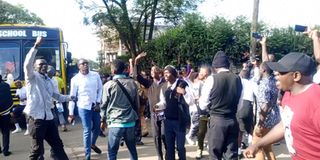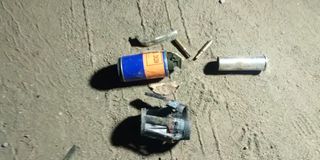How serene, quiet, Nakuru suburbs were caught up in 'Echoes of war' drama

Residents and students chanting anti-government slogans after Butere girls students boycotted staging of their play on April 10,2025.
What is usually a quiet Wednesday evening and Thursday morning for families living around Kirobon Girls and Melvin Jones school respectively turned into moments of terror and chaos, as police lobbed teargas canisters and fired live bullets in the air.
You see the two estates are nestled away from Nakuru city's chaos, boasting of being addresses that many Nakuru residents want to live in.
However, on Wednesday night, this peace was distrupted in Kirobon, near Ngata estate.
The cause, the director of the play Echoes of War, former Kakamega Senator Cleophas Malala, was being stopped from accessing Butere Girls students at Kirobon Girls, where they were being hosted.
What followed quickly escalated into full-blown chaos.
According to eyewitnesses and journalists present, police descended on the area shortly after 5 PM. The scene escalated rapidly as officers clashed with the press, lobbing teargas and discharging live rounds into the air.
The altercation, which lasted approximately 30 minutes, left many residents gasping for air, trembling in fear, and questioning the motive behind such a heavy-handed response.
Residents living near the school, including young children and the elderly, were caught completely off guard.

Teargas canisters and bullet casings collected by residents neighboring Kirobon Girls after police shot at and tear gassed journalists on the evening of April 9, 2025.
“We were just winding down for the night when we heard what sounded like gunshots,” says a resident, a mother of three whose home borders the school. “The smoke followed shortly after and we could only peep through the window unaware what was going on. The kids were screaming. We thought there was a raid.”
Shortly after the police retreated, concerned residents crowded around the gates of Kirobon Girls, trying to make sense of the chaos.
Angered, residents questioned the link between Malala’s presence and the police’s aggressive tactics.
“Did they have to cause such unrest in a whole community just to get to one man?” askes one resident. “Was the presence of a man and unarmed journalists such a threat that it justified terrorizing schoolgirls and families?”
The turmoil didn’t end there.
On Thursday, a similar scene unfolded outside Melvin Jones School. Students and residents had gathered in solidarity after the school’s performance of "Echoes of War" was suddenly not staged as scheduled.
Emotions ran high as students and locals escorted the Butere Girls bus from the compound, chanting anti-Ruto slogans and, “No Butere, No Drama.”
Police again responded with teargas and fired shots into the air, sending students and residents scrambling for cover.
“It was heartbreaking,” says a teacher in the midst of the crowd. “Instead of encouraging creativity and expression, they responded with force.”
As the dust settled, families around Melvin Jones were left traumatized and full of unanswered questions. Many only dared to peer from their gates and balconies, trying to make sense of what had happened.
“I wonder what the police were doing shooting in the air,” says a resident. “This is a residential area with homesteads and high-rise apartments. What if a bullet hit someone? Children are home for the holidays. This is how the Kisumu incident with Baby Pendo happened.”
Others questioned the logic behind the operation.
“What was so hard about securing the Butere Girls students?” another asks. “Students obey their teachers. Why couldn’t the officer in charge simply instruct them to leave? Instead, they chose to hide behind teargas and intimidation, yet the school bus driver was cooperating.”
The use of force near schools and homes has triggered public outcry, with several organizations calling for an independent investigation into police conduct and greater accountability from event organizers and education officials.
Meanwhile, parents around school holding and hosting students participating in the 63rd edition of the National Drama festivals are questioning whether they are safe.
“They’ve done it once. What’s to stop them from doing it again?” says Susan Wangui, who runs a cereal shop near the festival grounds. “Even the heavy police presence near our businesses and homes is unsettling.”


